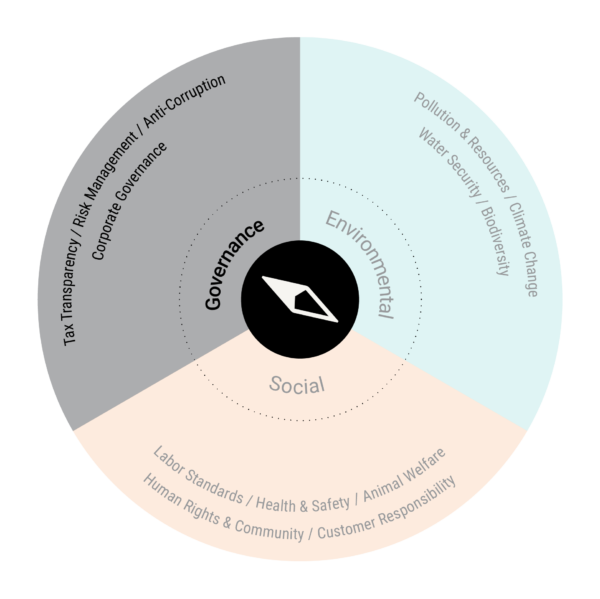Governance is the G in the Environmental Social Governance (ESG) model and refers to economic and legal corporate compliance, like promoting transparency and preventing corruption. We have chosen to sort chemical compliance, our Restricted Substances List (RSL) under Governance. For Brav, Governance also refers to the UN Sustainability Development Goal #17 Partnerships for the Goals, global partnerships for sustainable development to reach Agenda 2030.

Any Partnerships?
How do we monitor and report?
Ethical trade and anti-corruption
Brav Norway AS (“Brav“) is, as emphasized in our Code of Conduct and underlying procedures, committed to complying with all applicable laws and regulations.
If our business partners (e.g. suppliers, distributors, consultants, or sales agents) violate ethical standards, this may pose both legal and reputational risks to our company. Our Third-Party Risk Management procedure provides tools to ensure that integrity risks are satisfactorily identified and considered in relation to onboarding and follow-up of our business parties and projects, and that the appropriate level of due diligence is performed.
This procedure applies to all Brav wholly-owned companies and employees worldwide. Furthermore, Brav shall use its best efforts to ensure this procedure, or procedures that set out the same standards with respect to third-party risk management, are implemented in its majority-owned companies.
It is the overall responsibility of Brav’s Chief Executive Officer (“CEO”) to ensure that each group company’s management (local manager) implements this procedure.
Risk mapping and categorization
To decide whether, and to what extent, a business partner shall be subject to integrity due diligence, a risk mapping must be conducted. The level of compliance risks (limited, low, medium, or high) associated with the business partner/project will in turn be decisive for the level of IDD required. In general, our partners are categorized based on contract and factory location and the country’s score on the Transparency International Corruption index, the value of the yearly business, and strategic importance. This categorization is the foundation for Financial Integrity Due Diligence (IDD) and Social Due Diligence (SDD). Risk assessment is performed before entering into a business relationship, periodically, and/or in case “red flag” incidents.
Brav, including all employees, shall never offer or receive illegal or inappropriate monetary gifts or other remuneration to achieve private or business benefits in their own interest or in the interest of customers, agents or suppliers. Brav has a zero tolerance for corruption. We require full transparency for all business transaction and do not accept bribes, facilitation payments or any other kind of improper private or business benefits to take place between Brav and suppliers, between suppliers and subcontractors, during social audits, quality controls, certifications or transport.
Our policy is further described in the documents Brav Employee Code of Conduct and Brav Supplier Code of Conduct, both policies downloadable under https://www.brav.com/responsibility/social/
Our products must be safe and healthy for our customers and the environment.
Brav is commited to ensure our products at all time are in compliance with the updated chemicals regulations Substances restricted under REACH – ECHA (europa.eu) and other world wide chemicals regulations such as Proposition 65, The Consumer Products Safety Act (CPSA) and TSCA.
All Brav suppliers must read, sign and follow our BRAV Restricted substance list RSL – Version 03.-1.3.2022.
We choose to lean on expert consultancy for double checking and advising on our updates in the regulations.
Brav is member of:
Speaking up and reporting unethical behavior
Brav is committed to building a culture of trust. To support this commitment, we encourage our employees and third parties working with us to raise concerns and report any suspected or potential breaches of laws, regulations or internal company policies.
Concerns may include, but are not limited to:
Protection against retaliation
Brav will not tolerate retaliation against anyone who speaks up. There will be no impact on the individual’s professional career for reporting possible violations in good faith.
How to report?
In the whistleblower helpline you can report through the below channels:
How will we handle the report?
KPMG will submit the concern to BRAV’s HR Director. The HR Department will, together with KPMG when applicable, investigate and assess the reported concerns and make specific assessments of the handling of your concern, e.g: Who should be involved in the handling of your concern, how can the concern be reviewed and investigated, what measures should BRAV implement based on your concern etc.
If relevant we may request our third-party provider KPMG to assist with an objective follow-up investigation. As far as possible, you can expect to be kept informed about the progress and results of the investigation.
You also have the right to notify other regulatory authorities or public authorities (e.g. the Labour Inspectorate, Data Inspectorate, Police etc.).
Our fundamental principles for follow-up of reported concerns are: